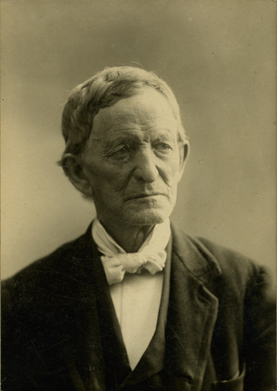Sela G. Wright (1795-1875) Papers
Biographical Notes & Background from the Oberlin College Archives
Rev. Sela(h) Goodrich Wright, educator and missionary, was born in Pompey(?), New York on July 1, 1816 to John (1791-1886) and Betsy Goodrich (1795-1875) Wright, farmers. After 1830 they moved to Medina, Ohio. Wright enrolled in the preparatory department of Oberlin College in 1840, but withdrew in 1843 to become one of the first members of the "Oberlin Band" of evangelical missionaries working among the Ojibwe (Chippewa) tribe in Minnesota. Wright returned to Oberlin in 1846 to marry Emiline Farnsworth (1822-1917) then he and his wife returned to Minnesota, serving at Red Lake, Lake Winnibigoshish, and Leech Lake until 1862. Seven children were born to them during these years. Wright was ordained in 1849 and added ministerial duties to his work in the schoolhouse. The mission dissolved in 1859 with few converts, but Wright and his family stayed among the Ojibwe until 1862 when an Indian uprising caused them to flee.
Wright settled his family in Oberlin in 1862, and went on to establish churches and schools for the American Missionary Association in the American South among the freed slaves. In 1867 he returned to Government service in Minnesota as a teacher among the Ojibwe, establishing a boarding school at Leech Lake to reduce the influence of family and tribe on the Native American students. He remained here until 1883 and served briefly in the late 1880's as a missionary to members of a Wisconsin tribe. He ultimately claimed 41 years of education and missionary work with the Ojibwe. During these years he, and his wife, acquired a very thorough knowledge and understanding of the Ojibwe language and he compiled a grammar text and dictionary of words in order to write materials for the Indians in their own language. That grammar and dictionary work never saw general publication, and is made available widely here for the first time.
Wright's career among the Indians was long, but not, by his measure, very successful. Although he had mastered the Ojibwe tongue and had a profound respect for its richness, he could not see that its fiber and essence came from the nomadic, subsistence life of the Ojibwe. In addition, although he abhorred the demoralizing effects of the unscrupulous traders and government agents and the intrusion of white settlers; he clung to his cultural prejudices, demanding the Ojibwe give up their culture and accept those same white values held by the intruders as evidence of conversion and "civilization." Wright died in Oberlin on 12 July 1906.
